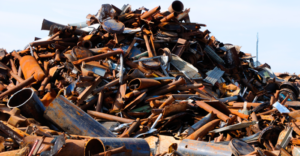
In January-September of this year, Ukrainian enterprises increased exports of ferrous scrap by 3.7 times compared to the same period last year, up to 131.131 thousand tons.
According to the statistics released by the State Customs Service (SCS), in monetary terms, exports of scrap metal amounted to $37.749 million in the period under review (a threefold increase).
At the same time, the export of scrap metal has been growing since March: in January, about 8.28 thousand tons of scrap were exported, in February – 16.5 thousand tons, in March – 15.45 thousand tons, in April – about 16.19 thousand tons, in May – 21.003 thousand tons, in June – 14.6 thousand tons, in July – 9.567 thousand tons, in August – 15.849 thousand tons, and in September – 13.7 thousand tons.
Scrap metal was exported to Poland (86.62%), Greece (7.16%) and Bulgaria (2.88%).
In the first two months of the year, the country did not import scrap metal; in March-September, it imported 793 tons of scrap worth $301 thousand (52.16% from Slovakia, 22.26% from Poland, 9.3% from Estonia).
Earlier, Ukrmetallurgprom President Oleksandr Kalenkov stated in an article on the Interfax-Ukraine website that scrap metal is exported through the European Union, which has a preferential export duty of EUR3 per ton, and from there the raw materials are redirected to real customers. Exporting raw materials directly to customers would cost EUR180 in export duty, and the Ukrainian budget has already lost UAH 350 million.
According to him, the State Bureau of Investigation has already taken an interest in such export schemes.
The head of Ukrmetallurgprom called for a temporary ban on the export of ferrous scrap to provide steelmakers with strategically important raw materials in the ongoing war.
“If the scrap metal remains in the country, more than 500,000 people will be employed and the country will receive millions in foreign exchange earnings from steel exports. At the same time, the military will also benefit, as steelmakers do a lot to help the military by purchasing equipment and vehicles for them and even producing bulletproof vests. No one benefits from scrap exports. That is why the government should be proactive and temporarily ban exports until the situation stabilizes and ceases to threaten national economic security,” Kalenkov said.
He clarified that a ton of scrap metal processed into steel brings in 10 times more to the budget than the EU export duty, which is about $300 per ton.
As reported, in 2022, Ukraine reduced exports of ferrous scrap by 11.5 times compared to the previous year to 53,557 thousand tons, while in monetary terms it decreased by 12.4 times to $19.271 million. At the same time, last year the country reduced imports of scrap metal in physical terms by 12.6 times to 1,824 thousand tons. tons, compared to the previous year – to $19.271 million tons, in monetary terms by 12.9 times – to $3.488 million. Imports of scrap metal in 2022 were mainly from Turkey (78.92% of supplies in monetary terms), the Russian Federation (13.25%) and Cyprus (5.08%); exports – to Turkey (38.97%), Poland (34.25%) and Greece (10.12%).
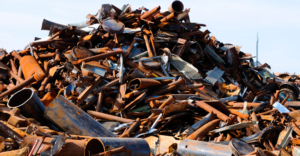
In January-August this year, Ukrainian enterprises increased exports of ferrous scrap by 3.9 times compared to the same period last year, up to 117,464 thousand tons.
According to the statistics released by the State Customs Service (SCS), in monetary terms, exports of scrap metal amounted to $34.127 million in the period under review (up 2.7 times).
At the same time, the export of scrap metal has been growing since March: in January, about 8.28 thousand tons of scrap were exported, in February – 16.5 thousand tons, in March – 15.45 thousand tons, in April – about 16.19 thousand tons, in May – 21.003 thousand tons, in June – 14.6 thousand tons, in July – 9.567 thousand tons, in August – 15.849 thousand tons.
Scrap metal was exported to Poland (86.20%), Greece (7.91%) and Bulgaria (3.19%).
In the first two months of the year, the country did not import scrap metal; in March-August, it imported 681 tons of scrap worth $261 thousand (49.43% from Slovakia, 21.07% from Poland, 10.73% from Estonia).
Earlier, Ukrmetallurgprom President Oleksandr Kalenkov stated in a column on the Interfax-Ukraine website that scrap metal is exported through the European Union, which has a preferential export duty of EUR3 per ton, and from there the raw materials are redirected to real customers. Exporting raw materials directly to customers would cost EUR180 in export duty, and the Ukrainian budget has already lost UAH 350 million.
According to him, the State Bureau of Investigation has already taken an interest in such export schemes.
The head of Ukrmetallurgprom called for a temporary ban on the export of ferrous scrap to provide steelmakers with strategically important raw materials in the ongoing war.
“If the scrap metal remains in the country, more than 500,000 people will be employed and the country will receive millions in foreign exchange earnings from steel exports. At the same time, the military will also benefit, as steelmakers do a lot to help the military by purchasing equipment and vehicles for them and even producing bulletproof vests. No one benefits from scrap exports. That is why the government should be proactive and temporarily ban exports until the situation stabilizes and ceases to threaten national economic security,” Kalenkov said.
He clarified that a ton of scrap metal processed into steel brings in 10 times more to the budget than the EU export duty, which is about $300 per ton.
As reported, in 2022, Ukraine reduced exports of ferrous scrap by 11.5 times compared to the previous year to 53,557 thousand tons, while in monetary terms it decreased by 12.4 times to $19.271 million. At the same time, last year the country reduced imports of scrap metal in physical terms by 12.6 times to 1,824 thousand tons. tons, compared to the previous year – to $19.271 million tons, in monetary terms by 12.9 times – to $3.488 million. Imports of scrap metal in 2022 were mainly from Turkey (78.92% of supplies in monetary terms), the Russian Federation (13.25%) and Cyprus (5.08%); exports – to Turkey (38.97%), Poland (34.25%) and Greece (10.12%).
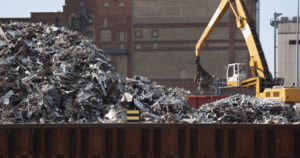
Ukrainian enterprises in January-July this year increased exports of ferrous scrap metal 3.5 times compared to the same period last year – up to 101.615 thousand tons.
According to statistics released by the State Customs Service (SCS) on Monday, in monetary terms, scrap metal exports for the period amounted to $29.807 million (an increase of 2.4 times).
At the same time, the growth of scrap metal exports was recorded since March: if in January about 8.28 thousand tons of scrap metal was exported, in February – 16.5 thousand tons, in March – 15.45 thousand tons, in April – about 16.19 thousand tons, in May – 21.003 thousand tons, in June – 14.6 thousand tons, but in July it decreased to 9.567 thousand tons.
Scrap metal exports in January-July-2023 were to Poland (87.70%), Greece (5.80%) and Bulgaria (3.65%).
In the first two months of the year the country did not import scrap metal, in March-July imported 573 tons of scrap for $222 thousand (45.05% from Slovakia, 21.62% from Poland, 12.61% from Estonia).
Earlier, the president of Ukrmetallurgprom, Oleksandr Kalenkov, stated in his column on the Interfax-Ukraine website that scrap metal is exported through the European Union, where there is a preferential export duty of EUR3 per ton, and from there the raw material is redirected to real customers. To export the raw materials to the clients at once would cost EUR180 export duties – and the Ukrainian budget has already lost UAH 350 mln on this.
According to him, the State Bureau of Investigation is already interested in such export schemes.
The head of Ukrmetallurgprom called for a temporary ban on the export of ferrous scrap to provide metal companies with strategically important raw materials amid the ongoing war.
“If scrap metal remains in the country – more than 500 thousand people will have jobs, and the country will have millions of foreign exchange earnings from steel exports. At the same time, the military will also benefit, because metallurgists help the fighters a lot, buying equipment and cars for them, and even producing body armor. No one will benefit from the export of scrap metal. Therefore, the authorities should act proactively and temporarily ban exports until the situation stabilizes and ceases to threaten national economic security,” said Kalenkov.
He specified that a ton of scrap metal processed into steel gives 10 times more to the budget than the export duty to the EU – about $300 per ton.
As reported, Ukraine in 2022 reduced exports of ferrous scrap in 11.5 times compared to the previous year – to 53.557 thousand tons, in money terms decreased by 12.4 times – to $19.271 million. At the same time, last year the country reduced imports of scrap metal in physical terms in 12.6 times – to 1.824 thousand. Imports of scrap metal in 2022 were mainly from Turkey (78.92% of supplies in monetary terms), Russia (13.25%) and Cyprus (5.08%); exports – to Turkey (38.97%), Poland (34.25%) and Greece (10.12%).
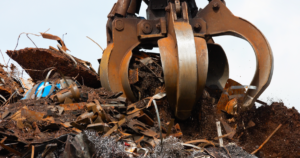
Ukrainian companies in January-May this year increased the export of scrap ferrous metals in 3.1 times compared to the same period last year – up to 77.452 thousand tons.
According to statistics released by the State Customs Service (SCS), the export of scrap metal for the period amounted to $23.028 million in monetary terms.
However, in March, April and May, there was an increase in exports of scrap metal: if about 8.28 thousand tons of scrap metal was exported in January and 16.5 thousand tons – in February, then in March – 15.45 thousand tons, April – about 16.19 thousand tons and May – 21.003 tons.
Exports of scrap metal in January-May 2023 was carried out in Poland (89.55%), Greece (7.51%) and the Netherlands (0.99%).
In the first two months of the year, the country did not import scrap metal, and in March-May imported 344 tons of scrap metal worth $138 thousand (41.30% from Slovakia, 18.12% from Poland and 13.77% from Estonia).
Earlier, the president of Ukrmetallurgprom Oleksandr Kalenkov wrote in his column on Interfax-Ukraine website that scrap metal is exported via the European Union, where a preferential export duty of EUR3 per ton operates, and from there the raw material is redirected to actual customers. To export scrap metal straight to customers would cost EUR 180 export duties and the Ukrainian budget has already lost 350 million hryvnias on it.
According to him, the State Bureau of Investigation has already taken interest in such export schemes.
The head of “Ukrmetallurgprom” urged to temporarily ban the export of scrap ferrous metals to provide the strategically important raw materials in the ongoing war.
“If scrap metal will remain in the country – more than 500 thousand people will have jobs, and the country will have millions of foreign exchange earnings from the export of steel. At the same time, the military also benefits, because metallurgists help the fighters a lot by buying equipment and cars for them, and even producing body armor. Nobody benefits from the export of scrap metal. That is why now the authorities should be proactive and temporarily ban the export until the situation stabilizes and stops threatening the national economic security,” says Kalenkov.
He noted that a ton of scrap metal, processed into steel, provides 10 times more to the budget than the export duty in the EU – about $300 per ton.
As reported, Ukraine in 2022, reduced exports of scrap ferrous metals in 11.5 times compared to the previous year – up to 53.557 tons, in monetary terms down to 12.4 times – to $ 19.271 million. At the same time last year, the country reduced the import of scrap metal in kind by 12.6 times – to 1.824 tons. Imports of scrap metal in 2022 was carried out mainly from Turkey (78.92% of supplies in monetary terms), Russia (13.25%) and Cyprus (5.08%), while exports – to Turkey (38.97%), Poland (34.25%) and Greece (10.12%).
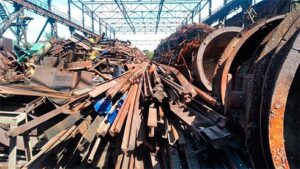
In January-May this year, scrap metal companies have reduced the procurement of scrap metal by 33.5% compared to the same period last year – up to 444.3 thousand tons.
As reported in the operational information of the Ukrainian Association of Secondary Metals (UAVtormet), the export of scrap metal during this period amounted to 77.5 thousand tons compared to 25.2 thousand tons in January-May 2022 (an increase of 3.1 times). In this case, the import of scrap amounted to 0.03 thousand tons, compared to 0.1 thousand tons in the first five months of last year.
Scrap shipments to the country’s metal companies in January-May 2023 decreased by 44.3% compared to January-May 2022 – to 345.7 thousand tons from 620.7 thousand tons.
As of June 1, 2023, the level of scrap metal stock at Ukrainian metal companies was estimated at 25-30 thousand tons.
As reported, Ukraine in 2022, reduced the procurement of scrap metal by 75.9% compared to the previous year – up to 996.7 thousand tons from 4.136 million tons. The export of scrap metal last year was 53.6 thousand tons, which is 11.5 times less than in 2021 (615.7 thousand tons). At the same time the import of scrap was 1.8 thousand tons, compared to 23 thousand tons in 2021.
Scrap supplies to steel companies in the country last year decreased by 73% compared to 2021 – to 895.7 thousand tons from 3 million 323.4 thousand tons.
“UAVtormet predicts that this year the procurement of scrap ferrous metals in the amount of 1.2-1.25 million tons. In addition, it is projected that in 2023, the supply of scrap metal to metal companies of the country will amount to 950-1000 thousand tons. Scrap exports are expected to amount to 180-200 thousand tons, while imports are expected to amount to 0.2-0.5 thousand tons. Steel output in 2023 will be 4.8-5.2 million tons.
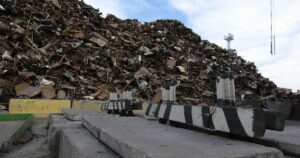
Ukrainian companies in January-April this year increased the export of scrap ferrous metals in 5 times compared to the same period last year – up to 56.449 thousand tons from 12.470 thousand tons.
According to statistics, promulgated by the State Customs Service (SCS), exports of scrap metal for the period amounted to $16.684 million (an increase of 3 times) in monetary terms.
However, in March and April, there was an increase in exports of scrap metal: if about 8.28 thousand tons of scrap metal was exported in January and 16.5 thousand tons in February, then in March – 15.45 thousand tons and in April – about 16.19 thousand tons.
Exports of scrap metal in January-April 2023 was carried out in Poland (97.37%), the Netherlands (1.10%) and Slovakia (0.67%).
In the first two months of the year, the country did not import scrap metal, in March-April, 176 tons of scrap metal worth $64 thousand (49.23% from Slovakia, 21.54% from Moldova and 15.38% from the Netherlands).
Earlier, Alexander Kalenkov, president of Ukrmetallurgprom, stated in his column on Interfax-Ukraine that scrap metal is exported via the European Union, where a preferential export duty of EUR3 per ton operates, and from there the raw material is redirected to actual customers. It would cost EUR 180 export duties if the scrap metal was exported directly to the customers – and the Ukrainian budget has already lost 350 million hryvnias on it.
According to him, the State Bureau of Investigation has already taken interest in such export schemes.
The head of “Ukrmetallurgprom” urged to temporarily ban the export of scrap ferrous metals to provide the strategically important raw materials in the ongoing war.
“If scrap metal will remain in the country – more than 500 thousand people will have jobs, and the country will have millions of foreign exchange earnings from the export of steel. At the same time, the military also benefits, because metallurgists help the fighters a lot by buying equipment and cars for them, and even producing body armor. Nobody benefits from the export of scrap metal. That is why now the authorities should be proactive and temporarily ban the export until the situation stabilizes and stops threatening the national economic security,” says Kalenkov.
He noted that a ton of scrap metal, processed into steel, provides 10 times more to the budget than the export duty in the EU – about $300 per ton.
As reported, Ukraine in 2022, reduced exports of scrap ferrous metals in 11.5 times compared to the previous year – up to 53.557 tons, in monetary terms down to 12.4 times – to $ 19.271 million. At the same time last year, the country reduced the import of scrap metal in kind by 12.6 times – to 1.824 tons. Imports of scrap metal in 2022 was carried out mainly from Turkey (78.92% of supplies in monetary terms), Russia (13.25%) and Cyprus (5.08%), while exports – to Turkey (38.97%), Poland (34.25%) and Greece (10.12%).
© 2016-2026, Open4Business. All rights reserved.
All news and diagrams placed on this Web site is made for internal use. Its reproduction or distribution in any form are welcome in case of placing a direct hyperlink to a source. Reproduction or distribution of information which contains Interfax-Ukraine as a source is prohibited without the written permission from the Interfax-Ukraine news agency. Photoes placed on this site are taken from open sources only; rightholder are welcome to make demands to info@open4business.com.ua , in this case we are ready to put your copyright to a photo or replace it.